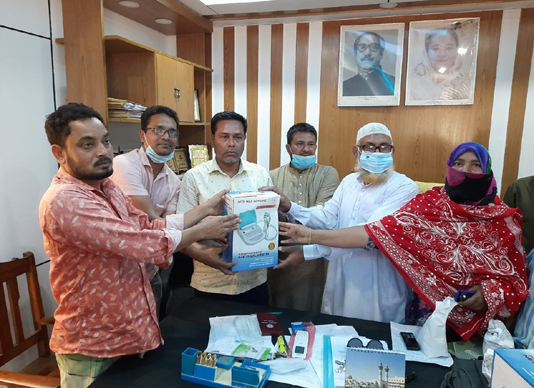By Dr Aynal Haque
RAJSHAHI, June 15, 2021 (BSS)- Some noble gestures are seen contributing a lot towards making the primary healthcare facilities functional benefiting the rural people, including expectant mothers in the region.
“We are getting various infrastructural and instrumental support from local Union Parishad (UP) Chairman Abdul Baki for delivering various essential services, including normal delivery, antenatal care (ANC), Postnatal Care (PNC) and neonatal care,” said Nadira Begum.
The chairman gave incentives worth Taka 200 to 12 pregnant mothers each for encouraging them to avail the services of normal delivery, ANC, PNC and neonatal care.
“We are also getting instrumental and motivational support from Public Health Improvement Initiative Rajshahi (PHIIR) Project for improving the maternal and neonatal services,” she added.
The non-government development entity has contributed to facilities renovation, community volunteers’ incentives, delivery beds, nebulizer machines, oxygen cylinders, electric fans and requisite furniture.
Nadira Begum, a Family Welfare Visitor (FWV) of Shironti Union Health and Family Welfare Centre (UH&FWC), said two community volunteers were given Taka 500 as Eid bonus each for boosting their inspiration besides level of confidence.
Located at Sapahar upazila in Naogaon district, the Shironti UH&FWC has got a permanent hand washing and water supply system with local initiatives benefiting the service-recipients amid the Covid-19 pandemic.
Nadira said trained community volunteers of the PHIIR project are bringing the pregnant mothers under ANC and PNC at the centre for their safe normal delivery.
This facility provided primary health care services along with normal delivery care to around 29,078 people since 2019. There was a big hole beside the UH&FWC.
“I have filled up the hole and I have a dream of establishing a garden there to make sure that the healthy babies and their mother can play with a big smile,” said Shironti UP Chairman Abdul Baki, while illustrating the contribution of PHIIR project in terms of making the primary healthcare facilities functional.
Taslima Akhter Brishti, 20, was blessed with her first baby through normal delivery at Shiranti UH&FWC without any complications on October 20 last.
She availed all the necessary reproductive healthcare services free of cost from the centre smoothly.
Another mother Resma Khatun, 21, wife of Mizanur Rahman of the same village, is also happy after obtaining their first baby through normal delivery in the same centre on November 30 last.
DASCOH Foundation has been implementing the PHIIR project with financial support of Swiss Red Cross (SRC) at five upazila health complexes, 42 Union Health and Family Welfare Centres and 110 Community Clinics at Bagmara, Charghat and Tanore upazilas in Rajshahi and Porsha and Sapahar upazilas in Naogaon.
The PHIIR project is being implemented with the main thrust of improving primary health care and mother, neonatal and child health with direct engagement of Local Government Institutions (LGIs), said Project Manager Tozammel Haque.
On behalf of the project, essential equipment like refrigerators, delivery beds, maternal care checkup beds, oxygen cylinders, weight scales, waste bins and curtains are being provided for labor rooms of the UH&FWCs and Union Sub Centers (USCs) to make those fit for various reproductive healthcare services including normal delivery.
Tozammel Haque said Sonadanga UP Chairman Azharul Haque has been playing a unique role towards reactivating and functioning of the Sonadanga UH&FWC since his leadership began here.
Divisional Director of the Department of Health Services Dr Habibul Ahsan Talukder said engagement of LGIs is very important for substantial and sustainable functioning and strengthening the primary healthcare facilities like Community Clinics, UH&FWCs and USCs.
As members of people’s representatives and LGIs, they can contribute and monitor the total activities of the facilities. They are also accountable for the well-being of the people.
The government and non-government collaborative efforts are being judged as substantial and sustainable promotion of institutional delivery besides reducing maternal and neonatal deaths, the health official added.



